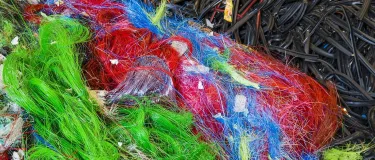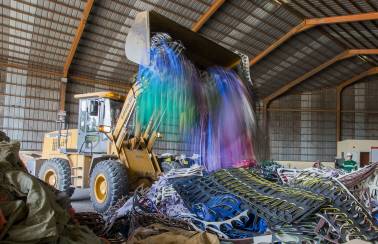From landfill to resource: how Geocycle contributes to the fight against plastic pollution
World Environment Day 2018 focuses on plastic pollution, and the changes we can make in our everyday lives to reduce its burden on our environment. Find out more about the role Holcim and Geocycle play in plastic recycling, and diverting this waste product from harmful landfill.
A global challenge...
The challenge of plastic pollution is increasingly capturing attention as one of the major environmental tests of our time. Although the production of plastic waste remains the main issue to tackle, we cannot ignore that plastic waste is often landfilled or incinerated and does not receive the appropriate treatment. Holcim’s waste management business Geocycle co-processes plastic waste that is otherwise not considered recyclable in its initial manufacturing process (i.e. plastic to plastic).
The plastic waste sorted for co-processing is contaminated by pollutants, or mixed with other plastics or waste streams, meaning it is not fit to be recycled into new plastic products. Geocycle draws a wide range of non-recyclable waste including industrial and municipal plastics. From the US to the Philippines, India to Costa Rica, Geocycle’s unique co-processing solution is saving non-recyclable waste from ending up in landfill, and helping to build and sustain local circular economies. In 2017, Geocycle treated the equivalent of plastic waste produced by around 13 million European households.
...needs a comprehensive solution.
Co-processing plastic waste in our cement plants is complementary to traditional recycling, offering an optimal treatment as 100% of its energy is recovered and its full mineral fraction (15% - 60% depending on the type of waste plastics are mixed with) is recycled into cement. In this way, Geocycle’s co-processing solution for plastic waste:
- offers a more sustainable alternative to landfilling or incineration, in line with EU waste treatment principles
- reduces plastic leakage and environmental contamination
- contributes to efforts to mitigate the effects of global warming and reduces the use of imported virgin fossil feedstock in cement manufacturing.
At European level, Poland is one of the strongest countries in plastic co-processing; Of 200,000 tons of waste co-processed in 2017, 163,000 tons were non-recyclable plastic. In the 20 European countries where Geocycle operates, 1.5 million tons of non-recyclable plastic were co-processed in 2017. In that year worldwide, Geocycle teams treated the equivalent of plastic waste produced by around 13 million European households.





